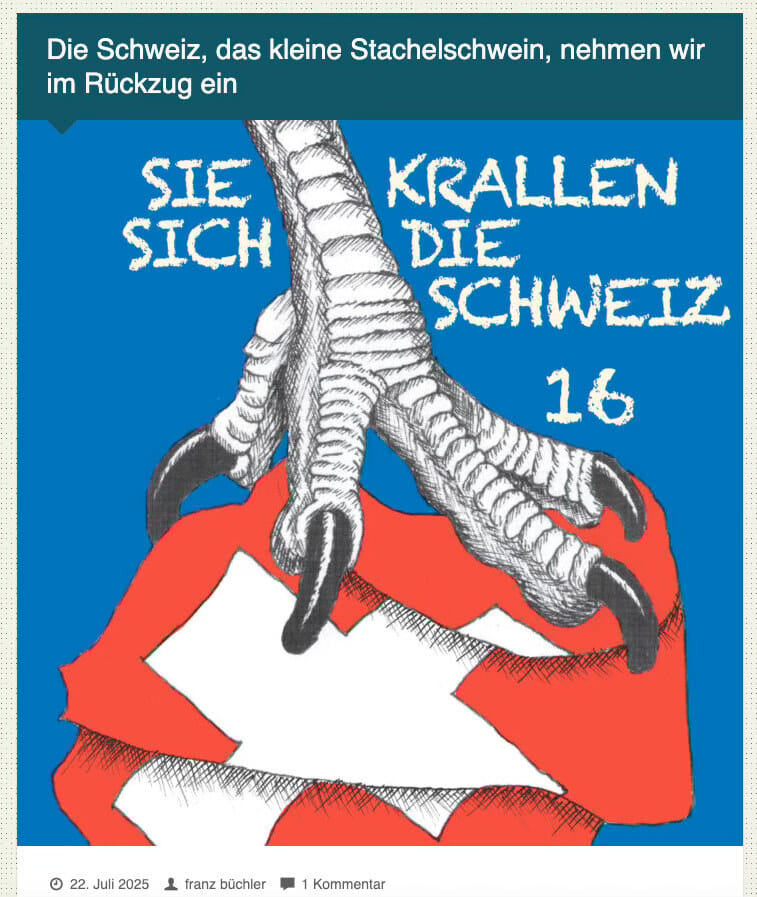- Pascal's Chatbot Q&As
- Posts
- Switzerland & Nazi regalia: How multiple cantons and political groups are calling for stronger enforcement mechanisms and an expanded scope that includes tattoos and digital dissemination.
Switzerland & Nazi regalia: How multiple cantons and political groups are calling for stronger enforcement mechanisms and an expanded scope that includes tattoos and digital dissemination.
However, the Swiss People’s Party (SVP) takes the opposite view, arguing that such a law would infringe on freedom of speech (...) a position Büchler clearly criticizes as dangerously permissive.
“Taking Switzerland, the Little Porcupine, in Retreat” — A Warning About Normalizing Fascism
by ChatGPT-4o
The article “We are taking Switzerland, the little porcupine, in retreat” by Franz Büchler is a poignant and provocative response to a deeply troubling event: a group of men dressed in full Nazi Wehrmacht uniforms hiking through the Swiss Alps. This unsettling spectacle, which culminated in a police intervention, has become a flashpoint for broader societal reflection on the normalization of fascist symbols and the adequacy of legal frameworks to prevent their public resurgence. The essay serves as both a critique and a wake-up call, warning against the creeping banalization of fascist iconography under the guise of reenactment, freedom of speech, or historical commemoration.
The Porcupine as Metaphor: Switzerland’s Defensive Posture
Büchler’s metaphor of Switzerland as a “little porcupine” — small but protected by sharp defensive quills — is significant. It evokes an image of a country that traditionally prides itself on neutrality and national resilience. Yet, the author argues that this defensive stance is being eroded not by overt attacks, but by insidious internal complacency. The visual of Nazi regalia in the Alps, a place symbolic of Swiss identity and freedom, challenges the very notion of a safe, ideologically neutral Switzerland. It implies that the porcupine is no longer defending itself — instead, it is being infiltrated by actors who test the limits of legality and tolerance.
Legal Vacuum: A Gap in Switzerland’s Legislation
Central to the article is the observation that, unlike in Germany or Austria, the public use of National Socialist symbols is still not entirely prohibited in Switzerland. Although Switzerland has taken steps to draft new legislation — with a consultation process launched by the Federal Council in December 2024 — the legal gap remains real and potentially dangerous. This policy vacuum allows far-right provocateurs to exploit ambiguities under the pretense of historical reenactment, tourism, or artistic expression.
The article references the upcoming Bundesgesetz über das Verbot des öffentlichen Verwendens von nationalsozialistischen Symbolen, and highlights how multiple cantons and political groups — including Basel-Landschaft and Obwalden — are calling for stronger enforcement mechanisms and an expanded scope that includes tattoos and digital dissemination. However, the Swiss People’s Party (SVP) takes the opposite view, arguing that such a law would infringe on freedom of speech and that objectionable symbols should simply be tolerated as expressions of individual beliefs — a position Büchler clearly criticizes as dangerously permissive.
Reenactment as a Political Statement, Not Neutral History
The author forcefully rejects any notion that the hikers’ actions were apolitical. He notes, rightly, that the Wehrmacht never fought in the Swiss Alps, and thus there can be no credible claim that the hike was a historically accurate reenactment. The implication is clear: such acts are performative and provocative — not educational, but ideological. Büchler sees them as part of a broader effort to normalize fascist aesthetics and desensitize the public to their presence.
This point connects to Hannah Arendt’s warning about the “banality of evil” — when the symbols of hatred and oppression become common and unremarkable in public space, society is in danger of forgetting the atrocities they represent. Büchler implies that a line is being crossed: tolerance of such symbolism, even if unintended, lays the groundwork for political regression and the erosion of democratic values.
The Fight Over Freedom of Expression
One of the core tensions in the article is between freedom of expression and protection from hate. Büchler challenges the notion that freedom of speech should shield fascist display, arguing instead that fascism, once normalized, seeks to destroy the very freedoms it hides behind. He implies that Switzerland must distinguish between expression that contributes to public discourse and expression that glorifies dehumanization.
The SVP's statement, cited in the article, suggests that society should tolerate a fringe of “insignificant crackpots.” Büchler counters that such tolerance can metastasize into mainstream acceptance. The Swiss example echoes similar debates across Europe and North America, where far-right groups test legal boundaries and exploit free speech protections to push hate-based ideologies into the public sphere.
Conclusion: Vigilance as a Democratic Imperative
In sum, Büchler’s article is a rallying cry against passivity. He warns that democracy and pluralism are not self-sustaining — they must be actively defended. The seemingly innocuous act of a “Nazi hike” is, in his view, part of a strategic cultural war being waged incrementally. The “retreat” mentioned in the title is not military — it is moral, cultural, and legal.
The real danger is not that fascists will storm parliaments in jackboots, but that they will walk unchallenged through mountain passes, shopping malls, and social media feeds, slowly reacclimating the public to their presence. The law, civil society, and political leadership must act in concert to ensure that such symbolism is not only condemned rhetorically but rendered legally and socially unacceptable.
Switzerland, the little porcupine, must not retreat into naiveté. It must sharpen its quills again — through legislation, education, and public vigilance — to defend the values that have kept it democratic, peaceful, and pluralistic for so long.
